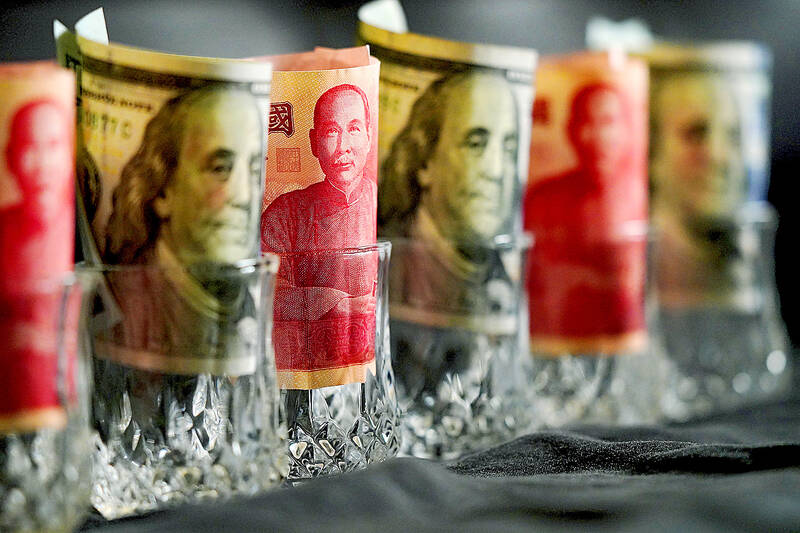A surge in the New Taiwan dollar last month spurred an influx of funds, driving local money-market rates to the lowest level in more than a year and potentially delaying monetary easing by the central bank.
The NT dollar has surged 11 percent since the end of March, which the central bank said was fueled by “excessive” inflows from exporters and foreign investors. Meanwhile, overseas buyers poured almost NT$220 billion (US$7.35 billion) into local equities last month as the benchmark index gained. That has bolstered liquidity in the interbank market — and the highest interest rate that financial institutions pay to borrow for one week has slid to a 14-month low.
Taiwan is one of the few economies in Asia that has not commenced an interest-rate-cut cycle as the elevated inflation and heated housing market offset concerns over the impact of global trade conflicts. Since corporate borrowing costs have already eased, policymakers might have more scope to keep rates on hold in their decision this month.

Photo: CNA
“The loose condition is beneficial for corporates to get loans from banks,” so the central bank should be in no rush to cut the reserve requirement ratio, Societe Generale SA Greater China economist Michelle Lam (林雪潔) said in an interview.
The front-loading of exports would keep demand resilient for now, so it is more likely to lower the reserve requirement ratio or interest rates in December, or even next year, depending on the actual impact of tariffs.
In addition to the repatriation of funds and securities inflows, Barclays Bank economist Bumki Son said that if the central bank wants to ease the appreciation pressure on the currency, it needs to buy the greenback and sell the NT dollar in the market — which is also increasing the supply of the local currency and thereby driving rates lower.
The monetary authority has urged trading firms to buy and sell the US dollar based only on their actual needs, and emphasized foreign investors would be contravening regulations if they did not put their money in securities as they reported.
The central bank has stepped up efforts to mop up liquidity. Outstanding negotiable certificates of deposit climbed to a one-year high, with combined issuance in April and last month amounting to about NT$630 billion, the most since 2020-2021 when a surge of the currency prompted similar efforts.
“Even if the central bank can drain funds through open market operations, it is sometimes difficult to fully absorb the excessive liquidity,” Son said.

CAUTIOUS RECOVERY: While the manufacturing sector returned to growth amid the US-China trade truce, firms remain wary as uncertainty clouds the outlook, the CIER said The local manufacturing sector returned to expansion last month, as the official purchasing managers’ index (PMI) rose 2.1 points to 51.0, driven by a temporary easing in US-China trade tensions, the Chung-Hua Institution for Economic Research (CIER, 中華經濟研究院) said yesterday. The PMI gauges the health of the manufacturing industry, with readings above 50 indicating expansion and those below 50 signaling contraction. “Firms are not as pessimistic as they were in April, but they remain far from optimistic,” CIER president Lien Hsien-ming (連賢明) said at a news conference. The full impact of US tariff decisions is unlikely to become clear until later this month

With an approval rating of just two percent, Peruvian President Dina Boluarte might be the world’s most unpopular leader, according to pollsters. Protests greeted her rise to power 29 months ago, and have marked her entire term — joined by assorted scandals, investigations, controversies and a surge in gang violence. The 63-year-old is the target of a dozen probes, including for her alleged failure to declare gifts of luxury jewels and watches, a scandal inevitably dubbed “Rolexgate.” She is also under the microscope for a two-week undeclared absence for nose surgery — which she insists was medical, not cosmetic — and is

GROWING CONCERN: Some senior Trump administration officials opposed the UAE expansion over fears that another TSMC project could jeopardize its US investment Taiwan Semiconductor Manufacturing Co (TSMC, 台積電) is evaluating building an advanced production facility in the United Arab Emirates (UAE) and has discussed the possibility with officials in US President Donald Trump’s administration, people familiar with the matter said, in a potentially major bet on the Middle East that would only come to fruition with Washington’s approval. The company has had multiple meetings in the past few months with US Special Envoy to the Middle East Steve Witkoff and officials from MGX, an influential investment vehicle overseen by the UAE president’s brother, the people said. The conversations are a continuation of talks that

CHIP DUTIES: TSMC said it voiced its concerns to Washington about tariffs, telling the US commerce department that it wants ‘fair treatment’ to protect its competitiveness Taiwan Semiconductor Manufacturing Co (TSMC, 台積電) yesterday reiterated robust business prospects for this year as strong artificial intelligence (AI) chip demand from Nvidia Corp and other customers would absorb the impacts of US tariffs. “The impact of tariffs would be indirect, as the custom tax is the importers’ responsibility, not the exporters,” TSMC chairman and chief executive officer C.C. Wei (魏哲家) said at the chipmaker’s annual shareholders’ meeting in Hsinchu City. TSMC’s business could be affected if people become reluctant to buy electronics due to inflated prices, Wei said. In addition, the chipmaker has voiced its concern to the US Department of Commerce